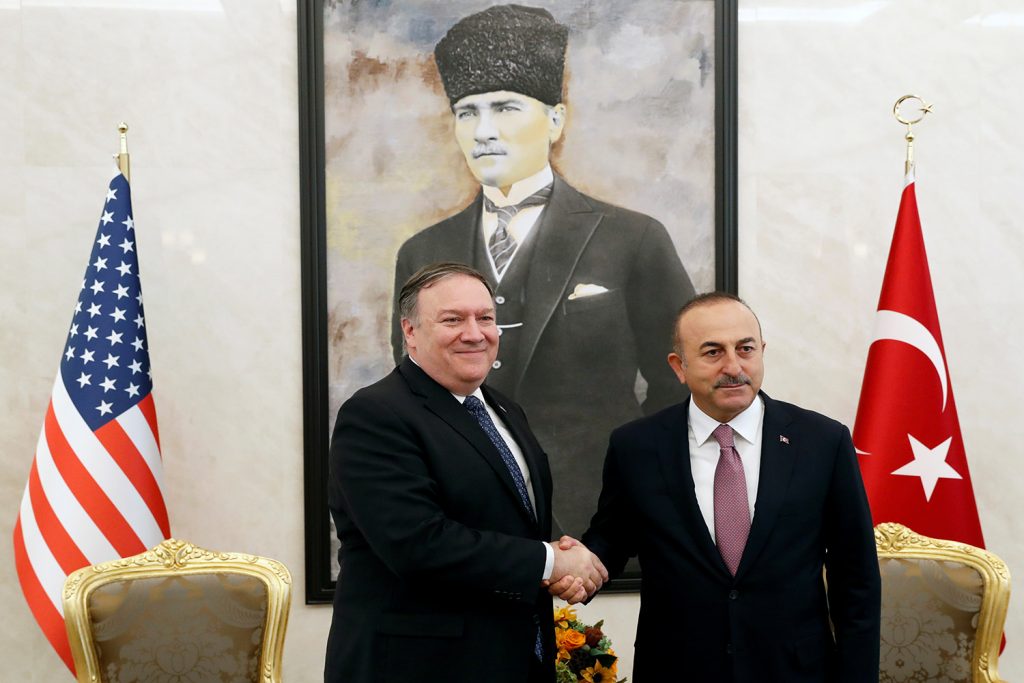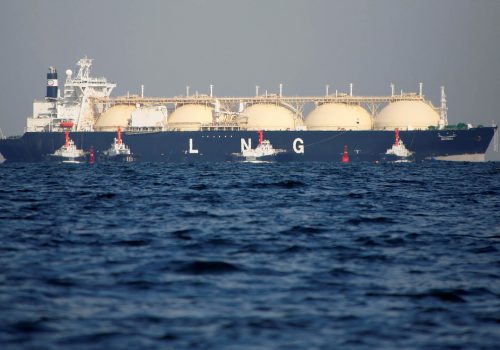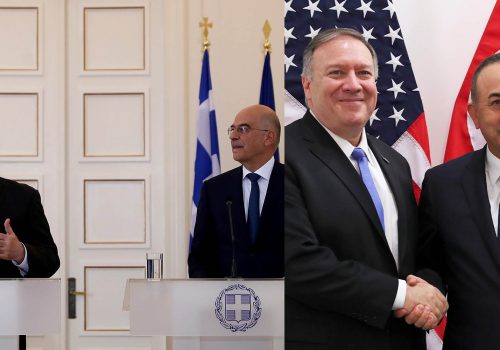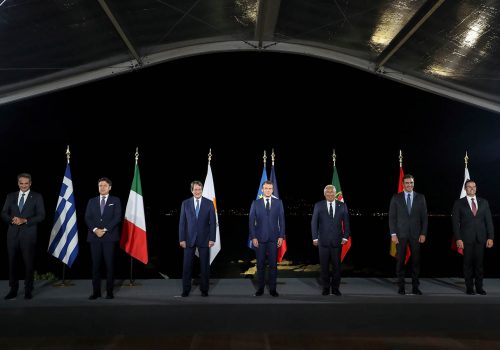Atlantic Council IN TURKEY’s online blog TURKEYSource* launches a short series of blogs based on our experts’ independent opinions covering a wide range of topics related to the US-Turkey relations in the context of the upcoming US Elections.
The 2020 US presidential election is just around the corner and the candidates have offered two truly contrasting visions for the future of US engagement in the world. In recent years, relations between the United States and its NATO ally Turkey have seen dramatic ups and downs, and Ankara has started to pursue a more independent foreign policy. Regardless of who wins the US elections, it is important to consider whether the United States and Turkey share enough common interests to facilitate strong cooperation moving forward.
Turkey remains an important and sometimes vital player on many current global challenges and conflicts, such as the war in Syria and Libya, the Eastern Mediterranean maritime disagreements, migration issues, and the West’s relations with Russia and Iran among others. The US elections could be incredibly consequential for all of these issues.
We asked four experts to comment on and provide recommendations for what main areas the United States and Turkey should cooperate on, what steps to take, what the next administration will need to do, as well as how the elections can affect US foreign policy in regional conflicts and the consequences for Turkey.
Turkey has obvious important interests in common with the United States.
Turkey is one of the handful of modern states and societies that has inherited from its centuries of history—and sustained through modern era existential tests—a “great power” outlook on its regional and world interests. Since at least the George W. Bush administration and the aftermath of the Gulf War, Americans have been debating and reconsidering US global interests and how best to pursue them. The core, vital national interests that I believe both peoples will continue to find in common beyond debate are their national security and prosperity. Certainly, less tangible cultural and political “values” also are important to Americans. I think most aware Americans and Turks would recognize that, as one of the world’s and the region’s leading and influential economic, military, and cultural powers, Turkey has obvious important interests in common with the United States, and that both countries should have a natural complementarity of capabilities to pursue them. The security, stability, and economic advancement of the Eastern Mediterranean, Black Sea, and Southwest Asia regions are merely among the most obvious; so is increasing bilateral trade and investment. Within these broad baskets of interests lie specific focal points like the development and transport of hydrocarbon energy supplies. More broadly, certainly a majority of educated Turks and Americans would find it axiomatic that their respective countries’ global interests, like effectively addressing the threats of climate change and the international spread of diseases, absolutely requires sustained, deliberate, skillful bilateral and multilateral collaboration of countries with large, highly mobile, high-consuming populations.
Francis J. Ricciardone is president of the American University in Cairo and former US ambassador to Egypt and Turkey.
There is more that should unite the United States and Turkey strategically than divides them
Despite a series of disagreements that grab headlines, there is more that should unite the United States and Turkey strategically than divides them. Geography alone dictates how deeply the two countries share vital national security interests: Turkey occupies a vital spot on the Eurasian map, physically connecting the Black Sea with the Middle East, and the Balkans and with the South Caucasus. Such positioning means that Turkey is a consumer of security from its NATO Allies, given the potential threats to its own national security from Syria and Russia; and Turkey is simultaneously a potential provider of security to help the United States and the rest of NATO manage conflicts in these regions.
Specifically, the United States and Turkey should work more closely together in Syria. Washington and Ankara both seek to see a political transition to a Syria without Assad, maintain Syria’s territorial integrity, constrain Russian military adventurism, and prevent further civilian atrocities.
On the final two points, in February 2020 Turkey carried out a groundbreaking drone attack that fought Russian and Assad-regime forces to a standstill in northwest Syria’s Idlib province, stopping a military offensive that had already caused thousands of civilian deaths and could have led to thousands more. Turkey was the only NATO Ally willing to confront Russia militarily in Syria, (and in Libya, as well).
Moreover, Turkey’s rapidly developing unmanned aerial vehicle (UAV) and other military technologies should be of strong interest to Washington in their own right.
Black Sea security is another important area of shared strategic interests between Washington and Ankara. Both NATO capitals view Russia’s invasions of Georgia in 2008 and Ukraine in 2014 as dangerous precedents when Moscow used military force to change borders. Moscow’s efforts to assert its military power throughout the Black Sea region have also included annexing Crimea, blocking the Kerch Strait to undercut Ukraine’s freedom of navigation between the Sea of Azov and Black Sea, upgrading the Black Sea Fleet, and deploying new air defense, electronic warfare, and other military capabilities in pursuit of an “anti-access, area denial” strategy against NATO in the region. Turkey and the United States also share an interest in Georgia’s eventual membership in NATO.
Finally, Turkey and the United States have worked together successfully for a quarter-century in support of East-West transit corridors linking Central Asia, the South Caucasus, Turkey, and the rest of Europe for oil and natural gas, road and rail transport, and data transmission. Air, land, and sea transport via such a corridor proved crucial to US-led NATO efforts to supply their troops in Afghanistan, providing one-third of all non-lethal material at the height of the war.
Matthew Bryza is a senior fellow with the Atlantic Council’s Global Energy Center. He served as a US diplomat for over two decades, including as US ambassador to Azerbaijan and deputy assistant secretary of state for European and Eurasian affairs.
Turkey’s geostrategic importance is an obstacle for honest US engagement with Turkey’s population
What makes Turkey so important for Washington is unfortunately its geographical relevance in a region where the United States has sought to maintain dominance. This geo-strategical importance has indeed been a factor which has prevented the United States from engaging with Turkey’s population in an honest fashion. It is time that the United States and key countries in Europe to remember that Turkey cannot be reduced to its ruler(s). Washington’s “Turkey agenda” should rise above Syria, Libya, or tensions with Greece. I am not saying that these are issues that the US president has the luxury to ignore. I am just trying to remind policymakers in Washington that winning over Turkey goes through connecting with its dynamic population of 85 million people. In this age, the governments cannot fix this alone anymore. It is the civil society who should lead on this. The $100 billion bilateral trade goal, which was drafted by spin doctors of the presidents to save the day cannot be materialized if people are not truly convinced to make a move towards each other.
The United States has always had the potential to play a mediating role between Turkey and Israel. Former President Barack Obama’s intervention in April 2013 to force Israeli Prime Minister Benjamin Netanyahu to pick up the phone and apologize to President Recep Tayyip Erdoğan for the killing of Turkish citizens on the Mavi Marmara flotilla is a perfect example. We know that the United States was a hidden actor in the talks that eventually led to a rapprochement between the two countries in 2016. However, the Trump administration’s imprudent approach of empowering Israel and Washington’s decision to move the US embassy to Jerusalem led to a loss of confidence in Turkey. A major shift in US foreign policy is needed if Washington wants to regain its balancing role in the region. There is a similar kind of distrust in Ankara regarding Washington’s relations with the Gulf countries since the Trump administration openly took the side of Saudi Arabia and United Arab Emirates in 2017 during a crisis between Riyadh and Doha. Turkey did not hesitate to send troops to Qatar at a time when President Trump called Qatar “a funder of terrorism at a very high level.”
If a future Biden administration prefers to fix the course with Turkey in the Syria, they should engage with Ankara more instead of simply ignoring the concerns of Turks. Meanwhile Washington could push for negotiations and eventually a compromise between Ankara and Syrian Kurds. The United States should also encourage Ankara to restart a domestic peace process with its Kurdish population and use incentives if necessary, to help push both sides to the negotiating table. A true peace at the Turkey-Syria border cannot be maintained unless there is peace inside Turkey.
Cansu Çamlıbel is the Editor-in-Chief of independent online newspaper Duvar English and former Washington correspondent for the daily Hürriyet.
From a geostrategic as well as from a political and economic perspective, the two countries depend on each other
Ultimately the United States and Turkey share the same strategic objectives. We should not allow ourselves to sacrifice important long-term goals because we failed to agree on how to reach those objectives. We simply have no other option except to find common ground because both countries are indispensable to each other. From a geostrategic, as well as from a political and economic perspective, these two countries depend on each other to realize their short-term and long-term objectives. While both governments might realize some of their short-term objectives without positive bilateral engagement, it will only be at higher cost.
When the Bush administration failed to convince the Turkish parliament to allow troop deployments to open a northern front to Iraq on March 1, 2003, the military and economic cost of this decision was difficult to swallow for US decision-makers. Although US forces still managed to bring down Saddam Hussein and liberate Bagdad, without Turkish cooperation more US lives were lost and much more money was spent. But most importantly the long-term goal of a peaceful, prosperous Iraq was lost. The vacuum left by the failure of US-Turkey cooperation was filled by Iran and the entire world is still suffering from the negative externalities of that outcome.
The region is laden with conflicts in Syria, Libya, Yemen, Lebanon, East Med, etc. All these conflicts are easier to manage if Turkey and the United States really work together and respect each other’s legitimate concerns. Working with the Kurdistan Workers’ Party (PKK)- affiliated Syrian Kurdish militias and hoping the Turks will ignore its adversaries building up a military force at its immediate border is not a winning strategy for Washington. Similarly, buying Russian-made defense systems because you failed to agree on how and when to procure a Western alternative, is not good policy that serves Turkish interests either.
We must find common ground, or the alternative is more turmoil starting with a refugee crisis that will keep growing and spilling over to other NATO countries while feeding international terrorism.
Given the already-existing global problems such as the pandemic and other major issues, both countries will lose big unless we manage to take a step back and iron out our differences.
Namık Tan is the former ambassador of the Republic of Turkey to the United States.
(*) The views expressed in TURKEYSource are solely those of the authors and do not necessarily reflect the views of the Atlantic Council, its staff, or its supporters.
More from TURKEYSource:
Image: US Secretary of State Mike Pompeo greets Turkish Foreign Minister Mevlut Cavusoglu before their meeting in Ankara, Turkey, October 17, 2018. REUTERS/Leah Millis/Pool



